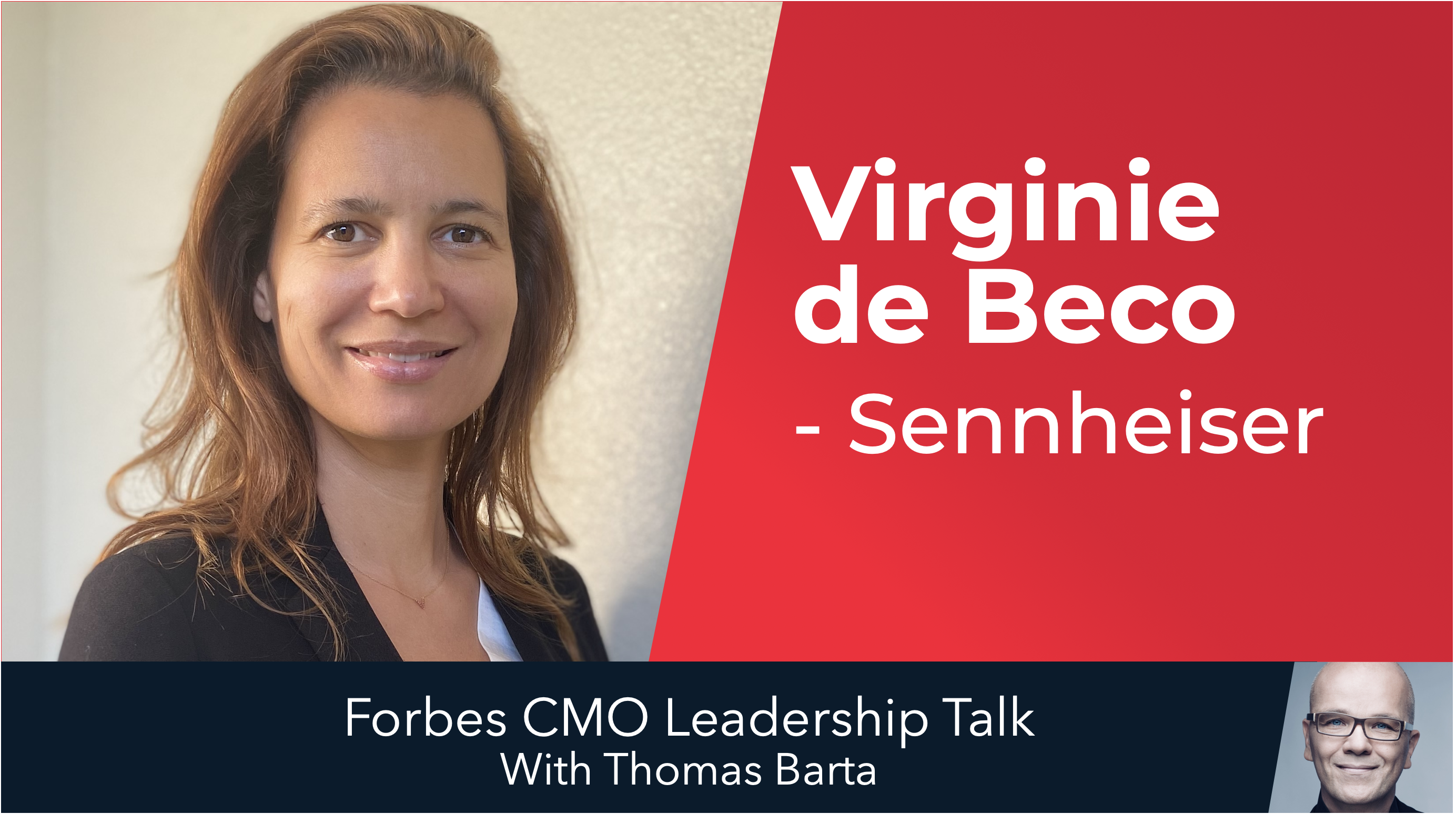What makes a successful top marketer?
For my Forbes column, I have spoken with Virginie de Beco, Sennheiser’s Global Head of Consumer Marketing. Virginie is also a Fellow of the Marketing Academy.
Thomas Barta: Virginie, what are you currently working on?
Virginie de Beco: Sennheiser is one of the leading manufacturers of headphones, speakers, microphones—a family-owned business since 1945. Because of the COVID-19 crisis and the rapidly changing market dynamics, we’ve been really working on the reset of our business strategy. Where are the key investment areas for profitable growth in the next three years? This is our big focus.
Barta: You mentioned COVID-19. How has it affected you?
De Beco: Like most people, we were caught by surprise. We couldn’t expect shops to close doors overnight. We still depend on offline retail. Obviously, this was a challenge. Our other channels, for example, Amazon, focused at certain points fully on the essential goods. Headphones were not, at first, considered as essential. This only changed when demand shot up as people were working from home.
Barta: What was the effect of COVID-19 on your marketing strategy?
De Beco: We had to carefully assess consumer trends during the crisis. We are making premium products. Would people go for premium, or would they retract and be very price sensitive? We created several scenarios—and we’ve been observing the situation day by day.
Barta: Over the last 12 months, what have you learned?
De Beco: I think everyone grew and learned so much. I learned to never take anything for granted. To be able actually to adapt very quickly. We had to take some very quick decisions. For example, reducing costs as sales were falling. We had to reduce work hours for parts of the workforce and cap some salaries. Very, very difficult measures.
Barta: What has worked for you during the crisis?
De Beco: Transparent communication. Our teams were part of the decisions. My marketing team went to a five-day week. Together, we refocused on our key projects—and handled them well. This has been amazing, because the team really engaged. Some people gained more independence.
As a family-owned firm, we are able to quickly form task groups with people from different departments, backgrounds, experience, geographies. We moved really fast from proposal to action. For example, we’ve launched new products. We’ve grown dormant categories. We engaged with our key customers. Agile working: it’s not a buzzword, it works. When we can go beyond silos, beyond the hierarchical set-up, we can do amazing things.
Barta: How can marketers help their firms restart now?
De Beco: We found really good opportunities during the crisis. I’d say: keep looking for opportunities. For us, for example, this was moving to direct-to-consumer—a space where we control the user experience and gain profitability. I’m sure there are opportunities for every marketer today.
Barta: New opportunities often mean big changes inside the firm. How was this for you?
De Beco: That’s true. Our digital transformation is a major effort. It’s challenging. With our premium products, we are a smaller player in the headphone business. Maintaining a strong presence in the offline retail presence is challenging. Moving into the online space is a great opportunity—but it’s also very competitive. But as marketers, we focus on the opportunity.
Barta: You talked about digital. How important is marketing data for you?
De Beco: Data is very important—it’s the basis for many decisions. But at the end of the day, when we go to the board, it’s all about top line and bottom line. This is why I really enjoyed reading your 12 Powers book. When you explain how marketeers need to talk the CEO language, you are so on point. It’s easy to slip into jargon and talk about marketing KPIs. Ultimately, we need to show revenues and profit. It’s that simple.
Barta: If data had the answer, what was your question?
De Beco: What’s the next technology that will shape people’s lives as much as the smartphone did?
Barta: You work for a family-owned firm. How do you get things done internally?
De Beco: Our company culture is very collaborative, but you are also part of the family. It’s very important not to come to the board with all your great arguments to ignite fireworks and show things for the first time. This won’t work. You need to vet your ideas beforehand with the different stakeholders, to have their angle, to give them time to think, and also to maybe reframe your proposal with their perspectives. This is the way to gain influence.
Barta: How do you reframe a proposal with other people’s perspectives?
De Beco: Reframing is not always easy—but it works. When you have engineers and marketers look at the same issue, we see different things. Understanding these perspectives is very powerful. Recently, for example, we decided to reinvest in our audiophile community. We are a love-brand for the music-passionate, tech-passionate—people who spend money and time on the quest for the perfect sound. This is also our DNA. We took this community for granted for too long. We’ve developed a marketing strategy to address this audience. In the process, we’ve discussed a lot with our engineers—who share the same passion. You know what? I didn’t know that engineers can be creative. I was wrong. They are! When we presented the strategy, we got a huge buy-in from day one.
Barta: You have a global job, you’ve moved countries many times. What was the bravest thing you’ve ever done?
De Beco: The bravest thing was probably moving to the Middle East and building a real purpose-based business. I always wanted to do something good for people. I got the chance at Del Monte, an American food company. We were starting the operation in the Middle East. I convinced the CEO we should embrace healthy eating in a region where obesity and diabetes is comparable to the U.S.—so hugely problematic. But healthy eating isn’t always convenient—a big pain point in the Middle East. So we developed an entire new product category but also new services, such as online delivery and an on-the-go coffee shop, based on healthy eating. With a very limited budget, I invested in promoting healthy eating in schools, which was both free and effective. I also convinced the CEO to embrace social media with an in-house agency—at a time when social media was still new. The business grew faster than we had anticipated—it was a real success. At the same time, I had my three small children around me.
Barta: That’s a very inspirational story. What’s your advice for marketers who would love to be braver?
De Beco: In the current environment, I can understand that some people are reluctant to be brave—prefer to stay in their comfort zone. But thinking safe is certainly not safe. We are only growing through transformation. If a marketer can’t bring growth to their organization, he or she isn’t a good marketer. That’s a recipe for failure. Embrace the unknown. Embrace the uncertainty. Focus on the growth you can influence.
Barta: You sound very confident. What gives you confidence?
De Beco: What gives me confidence are the people I work with. Everyday I learn from them. I’m so amazed of what positive teamwork can bring. Yesterday I had my last town hall of the year, to recognize the team’s hard work and dedication despite the challenges. I’m still feeling this energy. Yes, I have confidence in people.
Barta: What’s the advice you would give to the younger Virginie?
De Beco: Be proud of yourself. I would tell my younger self: You will meet amazing people. People you will look up to. But those relationships are only to nurture what’s already inside you—that’s just waiting to flourish. Don’t try to be someone else. Be you!
This interview first appeared on Forbes.com


